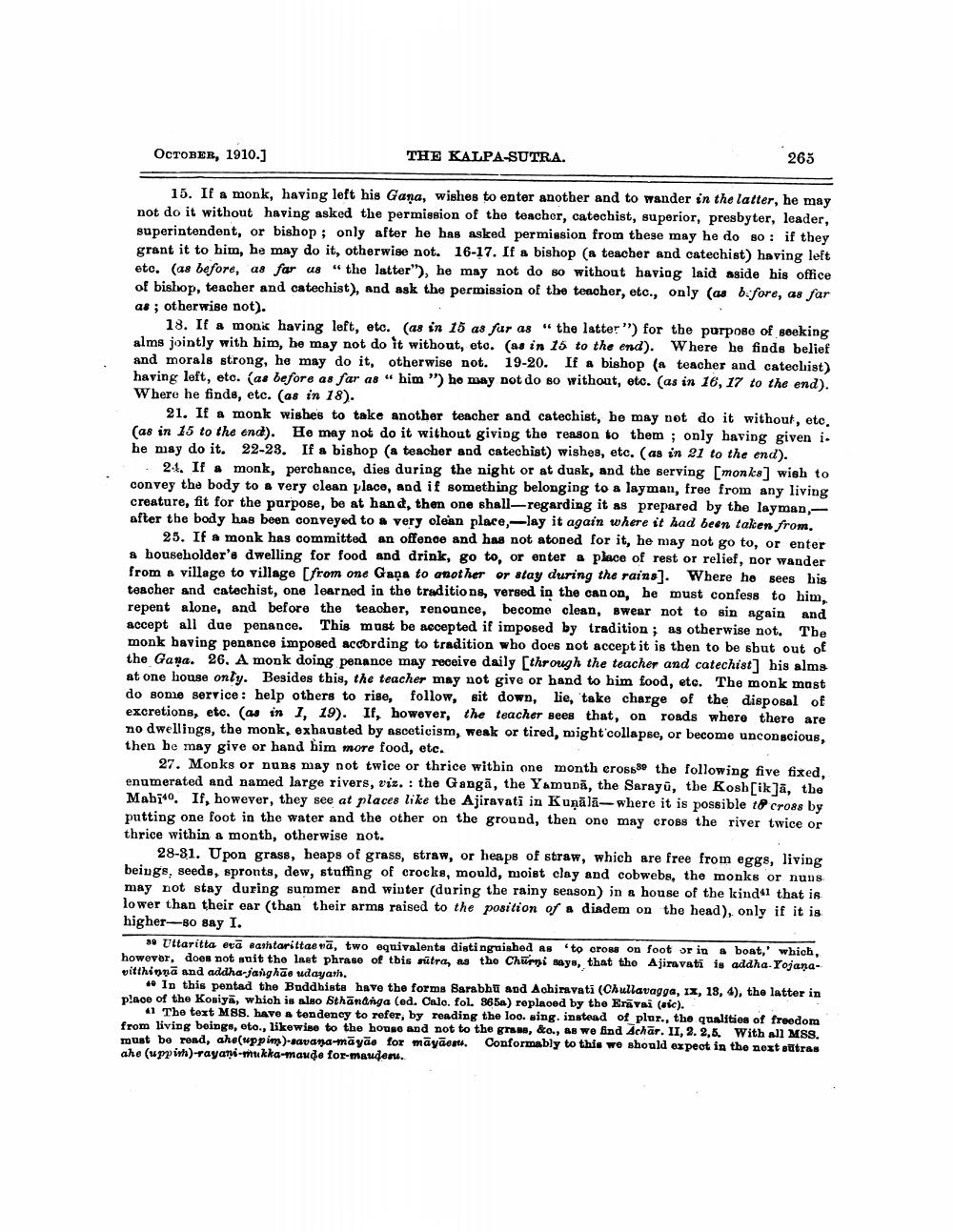________________
OCTOBER, 1910.)
THE KALPA-SUTRA.
265
15. If a monk, having left his Gana, wishes to enter another and to wander in the latter, he may not do it without having asked the permission of the teacher, catechist, superior, presbyter, leader, superintendent, or bishop ; only after he has asked permission from these may he do 8o : if they grant it to him, he may do it, otherwise not. 16-17. If a bishop (a teacher and catechist) having left etc. (as before, as far us “the latter'), he may not do so without having laid aside his office of bishop, teacher and catechist), and ask the permission of the teacher, etc., only (as b.fore, as far as; otherwise not).
18. If a monk having left, etc. (as in 15 as far as “the latter") for the purpose of seeking alms jointly with him, he may not do it without, etc. (as in 15 to the end). Where he finds belief and morals strong, he may do it, otherwise not. 19-20. If a bishop (a teacher and catechist) having left, etc. (as before as far as “him " he may not do so without, etc. (as in 16, 17 to the end). Where he finds, etc. (as in 18).
21. If & monk wishes to take another teacher and catechist, be may not do it without, etc. (as in 15 to the end). He may not do it without giving the reason to them ; only having given i. he may do it. 22-23. If a bishop (a teacher and catechist) wishes, etc. (as in 21 to the end).
2.4. If a monk, perchance, dies during the night or at dusk, and the serving [monks] wish to convey the body to a very clean place, and if something belonging to a layman, free from any living creature, fit for the purpose, be at hand, then one shall-regarding it as prepared by the layman,after the body has been conveyed to a very clean place, -lay it again where it had been taken from.
25. If a monk has committed an offence and has not atoned for it, he may not go to, or enter & householder's dwelling for food and drink, go to, or enter a place of rest or relief, nor wander from a village to village (from one Gaņa to another or stay during the rains). Where he sees his teacher and catechist, one learned in the traditions, versed in the canon, he must confess to him, repent alone, and before the teacher, renounce, become clean, swear not to sin again and accept all due penance. This must be accepted if imposed by tradition; as otherwise not. The monk baving penance imposed according to tradition who does not accept it is then to be shut out of the Gana. 26. A monk doing penance may receive daily [through the teacher and catechist] his alms at one house only. Besides this, the teacher may not give or hand to him food, etc. The monk mast do some service: help others to rise, follow, sit down, lie, take charge of the disposal of excretions, etc. (as in 1, 19). If, however, the teacher sees that, on roads where there are no dwellings, the monk, exhausted by asceticism, resk or tired, might'collapse, or become unconscious, then he may give or hand him more food, etc.
27. Monks or nuns may not twice or thrice within one month crosse the following five fixed, enumerated and named large rivers, viz. : the Gangā, the Yamunā, the Sarayü, the Kosh[ik]ā, the Mabī0. If, however, they see at places like the Ajiravati in Kuņālā- where it is possible to cross by putting one foot in the water and the other on the ground, then one may cross the river twice or thrice within a month, otherwise not.
28-81. Upon grass, heaps of grass, straw, or heaps of straw, which are free from eggs, living beings, seeds, spronts, dew, stuffing of crocks, mould, moist clay and cobwebs, the monks or nuns may not stay during summer and winter (during the rainy season) in a house of the kind that is lower than their ear (than their arms raised to the position of a diadem on the head), only if it is higher--50 say I.
80 Uttaritta etā sashtarittaerā, two equivalents digtinguished as to cross on foot or in a boat, which, however, does not suit the last phrase of this nitra, as the Churni says, that tho Ajiravati is addha Yojanavitthiopā and addha-janghão udayath. 40 In this pentad the Buddhists have the forma Barabhu and Achiravati (Chullavagga, ix, 13, 4), the latter in
iya, which is also thānanga (ed. Calo. fol. 8650) replaced by the Era vai (aic). The text MSS. have a tendency to refer, by reading the loo. sing. instead of plur., the qualities of freedom from living beings, eto., likewise to the house and not to the grana, &o., as we find Achar. II, 2. 2,5. With all MSS. must be read, ahe(uppim)-savana-māyāe for māyāent. Conformably to this we should expect in the next outras ahe (uppi)-rayati-mukka-maude for-mauden.




